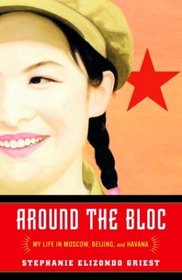Helpful Score: 2
At a lecture by a international CNN journalist, Stephanie asks how to get a job like his. His answer- learn to speak Russian. And she does.
Stephanie Elizondo Griest is a Mexican-American, a high school student when the Soviets lost power, and when the Tiananmen Square Rebellion occurred. What do the people of her generation think about communism? Are they yearning for freedoms we take for granted? Do they hope for democracy? What does her generation of Moscovites feel possible?
Arriving in Moscow as a university student, she is hoping to be a part of campus polotics, maybe be part of a demonstration. It turns out that what the students do to exercise their freedom, is, well nothing.
In Beijing, surely the people are anxious to communicate uncencored! Er, not really. At her newspaper job she proposes to teach a workshop called "Investigative Reporting". She is told:
"You know that Chinese journalists aren't allowed to be critical of the government. We can't be political!"
"But investigative reporting doesn't have to be political."
"Everything in China is political!"
And her lifestyle as a vegetarian (at her commune in Texas, they once denounced someone for sneaking in a box of KFC) doesn't go over well in China. Does jellyfish qualify as "meat"? From a Chinese menu:
"Anything that flies in the sky but kites, anything that has four legs but stools"
In Cuba she discovers that maybe learning more about herself before applying her democratic conventions would be helpful. Like learning spanish.
This is a hilarious, insightful book, researched at street level. She tries to go into these places without preconcieved judgements, but is still surprised with what she finds. I just loved her stories of experiences and people she meets.
A Russian toast: "We will drink, we will have a good time, and then the time will come when we die"....less
Stephanie Elizondo Griest is a Mexican-American, a high school student when the Soviets lost power, and when the Tiananmen Square Rebellion occurred. What do the people of her generation think about communism? Are they yearning for freedoms we take for granted? Do they hope for democracy? What does her generation of Moscovites feel possible?
Arriving in Moscow as a university student, she is hoping to be a part of campus polotics, maybe be part of a demonstration. It turns out that what the students do to exercise their freedom, is, well nothing.
In Beijing, surely the people are anxious to communicate uncencored! Er, not really. At her newspaper job she proposes to teach a workshop called "Investigative Reporting". She is told:
"You know that Chinese journalists aren't allowed to be critical of the government. We can't be political!"
"But investigative reporting doesn't have to be political."
"Everything in China is political!"
And her lifestyle as a vegetarian (at her commune in Texas, they once denounced someone for sneaking in a box of KFC) doesn't go over well in China. Does jellyfish qualify as "meat"? From a Chinese menu:
"Anything that flies in the sky but kites, anything that has four legs but stools"
In Cuba she discovers that maybe learning more about herself before applying her democratic conventions would be helpful. Like learning spanish.
This is a hilarious, insightful book, researched at street level. She tries to go into these places without preconcieved judgements, but is still surprised with what she finds. I just loved her stories of experiences and people she meets.
A Russian toast: "We will drink, we will have a good time, and then the time will come when we die"....less




![header=[] body=[Get a free book credit right now by joining the club and listing 5 books you have and are willing to share with other members!] Help icon](/images/question.gif?v=90afaeb39)
